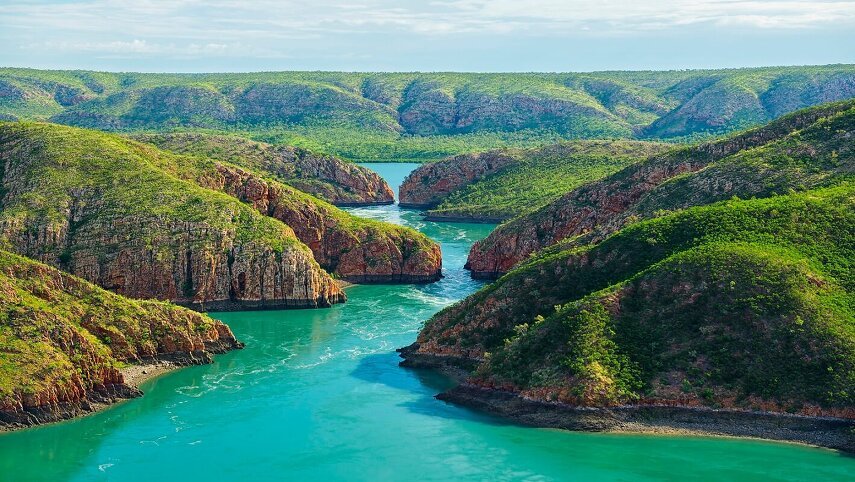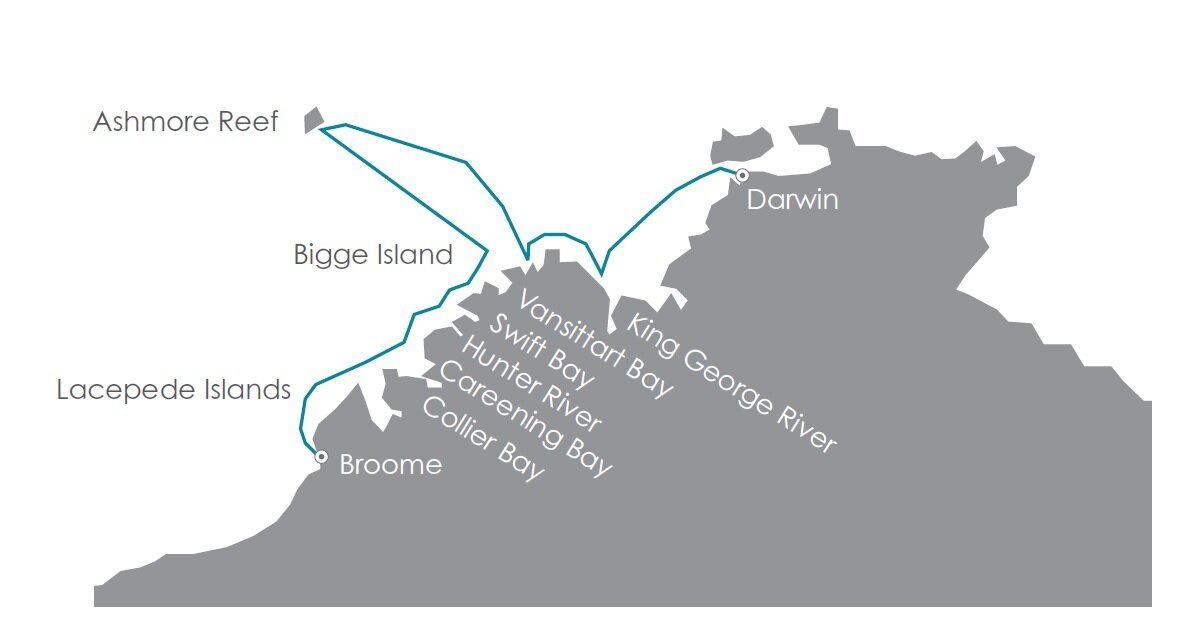Overview
Forged by nature and spanning more than 400,000 square kilometres, Western Australia's wild and remote coastline marries a treasure trove of towering, fractured iron-tinged red cliffs, torrential waterfalls, azure waters, hidden coves and caves, secluded white sand beaches, magnificent reefs and rare and...read more endangered wildlife with indigenous customs and connections to an ancient land, and rich history.
Best explored by expedition vessel, our Kimberley cruises allow an up close and intimate exploration and immersion of this rugged wilderness dwarfed by nature on an unfathomable scale. Highlights of our voyage include the unforgettable spectacle of King George Falls cascading 80-metres down …
READ MORE
Join pioneering small ship expedition cruise company Heritage Expeditions on a thrilling in- depth exploration of Australia's world-famous Kimberley Coast, one of the world's most pristine and untouched wildernesses, aboard our luxurious, 140-guest expedition ship Heritage Adventurer.
Forged by nature and spanning more than 400,000 square kilometres, Western Australia's wild and remote coastline marries a treasure trove of towering, fractured iron-tinged red cliffs, torrential waterfalls, azure waters, hidden coves and caves, secluded white sand beaches, magnificent reefs and rare and endangered wildlife with indigenous customs and connections to an ancient land, and rich history.
Best explored by expedition vessel, our Kimberley cruises allow an up close and intimate exploration and immersion of this rugged wilderness dwarfed by nature on an unfathomable scale. Highlights of our voyage include the unforgettable spectacle of King George Falls cascading 80-metres down 2,000 million-year-old towering cliffs, the outdoor galleries showcasing the ancient Aboriginal rock art of the Gwion Gwion and Wandjina people, World War II relics, early explorer history and an optional helicopter excursion to Mitchell Falls.
At Talbot Bay we will experience the power of the region's massive tidal movements and the world's only Horizontal Falls described by David Attenborough as "one of the greatest wonders of the natural world", and marvel as the world's largest inshore reef system at nearby Montgomery Reef 'rises' out of the water with the falling tide.
Hidden among jagged sandstone monoliths, the final resting place of the remarkably preserved skeleton of a WWII Douglas C-53 Skytrooper (DC-3) awaits discovery at Vansittart Bay, while a glimpse into Australian colonial history can be found carved into the trunk of the centuries old Mermaid Boab Tree at Careening Bay. Enjoy astounding wildlife encounters and observations from the region's iconic saltwater crocodiles through to the birding paradise of the Lacepede Islands and one of the world's largest and most pristine mangrove systems along the Hunter River home to White-bellied Sea Eagle, Osprey, Red-headed Honeyeater, Blue- spotted Mudskippers, Fiddler Crabs and more.
Discover an ancient landscape like no other as we expedition cruise the untouched beauty of Australia's iconic Kimberley and experience the truly epic scale of this magnificent region by ship and Zodiac on this unforgettable Australian adventure.
Itinerary
Join Heritage Adventurer this afternoon at Darwin Port, Australia's ‘northern gateway' famous for its glittering harbour, World War II history and enviable tropical outdoor lifestyle. The captain and expedition team will be waiting to greet you on arrival and show you to your cabin. You will have time to settle in and familiarise yourself with the ship; we will also take the opportunity to introduce you to your expedition team and our voyage plans. You are invited to join the expedition team in the Observation Lounge and up on the Observation Deck as we set sail for the Kimberley.
Our approach to King George River gorge is not to be missed and best experienced out on the Observation Deck as the towering 2,000 million-year-old Warton sandstone cliffs dwarf our vessel. Navigating this scenic stretch of water by Zodiac there's much to take in passing the ever-changing eroded rockfaces as we cruise deeper into the gorge marvelling at the untouched beauty of this iconic waterway. As we reach the end of the gorge nothing will prepare you for the grand scale spectacle of the Kimberley's highest single-drop falls as the King George River plummets 80 metres over the edge of towering of ancient red sandstone cliffs into tidal waters.
Undoubtedly one of Australia's most awe-inspiring natural wonders, the twin falls known as male and female Rainbow Serpents or Wunkurr by the Balanggarra people, are fed by wet season rains and rightly hold a special place in indigenous lore. While here we will learn about how this natural wonder was created and enjoy a closer look.
Beautiful islands, pristine white beaches lapped by turquoise waters, secluded coves and stunning scenery abound in Vansittart Bay which is also the location of a historical World War II site and incredible ancient Aboriginal rock art. Named after the Chancellor of Exchequer by early explorer Rear Admiral Philip Parker King, this striking, naturally protected bay is framed by scattered jagged sandstone monoliths and the final resting place of the preserved skeleton of a WWII Douglas C-53 Skytrooper (DC-3) which crash landed onto the saltpan after running out of fuel during a mercy mission to evacuate four Dutch citizens from Java.
On Jar Island, the location of ancient outdoor Aboriginal Gwion Gwion art galleries set among fascinating caves and rock formations, much of the rock art tucked under ledges and featured on cave walls is estimated to be up to 40,000 years old and remarkably preserved, protected from the elements. The island is also home to some interesting flora and fauna including the Golden-backed Tree Rat, echidnas and birdlife. Discover a bounty of anthropological and historical wonders in Vansittart Bay.
Closer to Indonesia than mainland Australia, Ashmore Reef is Australia's most remote marine park. Its three tropical islands are surrounded by coral reefs and home to more than 500 species of fish, 225 reef-building coral species and 100,000 nesting sea birds. A designated important bird area (IBA) and mostly Sanctuary Zoned, access to Ashmore Reef is strictly controlled. Our visit is in compliance with Australian Government regulations, however there may be an opportunity for a Zodiac cruise near West Island.
Today we explore the sites of ancient Aboriginal rock art on Bigge Island and the historic Mermaid Boab Tree, which bears the name of the HMC Mermaid which was famously carved into it while the ship was beached there undergoing emergency repairs during Philip Parker King's third voyage of discovery of the region in 1820. Now measuring some 3 metres wide and National Heritage listed, the tree offers a glimpse into Australian colonial history, while an old Makassan Islamic prayer alcove can be found behind the tree. While here we will also explore the jaw-slackening, otherworldly sandstone coastline of York Sound with its incredible sea caves and fascinating wildlife.
Our intrepid Kimberley voyage sees us today navigating the scattered islands, known as the Bonaparte Archipelago, which stretching almost 150 kilometres along the dramatic coastline. Our destination today is the remote and unspoiled inlet of T-shaped Swift Bay with its sandy beaches, ominous sea-worn caves and mangroves. A Zodiac cruise here allows a closer look at this incredible coastline where we will also likely observe salt-water crocodiles. On land a number of rock art galleries display the unique Wandjina and Gwion Gwion styles on a large scale, denoting the region's cultural importance.
During our explorations of the Hunter River today it will quickly become apparent why this winding, 30-kilometre stretch of water is widely considered to be one of the highlights of the Kimberley coast. Tucked into the north-east corner of Prince Frederick Harbour, an enormous bay which puts the Kimberley's epic scale into perspective, this scenic wonderland is dotted with islands and flanked with wildlife-filled mangrove-lined rivers, savanna woodlands and patches of lush monsoon rainforest, courtesy of receiving the lion's share of the region's rainfall, and soaring red cliffs.
At the river's mouth the unrestrained grandeur of 200-metre-high sandstone escarpment Kampamantiya keeps silent sentry, welcoming us into this otherworldly realm we will be exploring today. Fed by two 90-metre waterfalls, the Hunter and the Donkin, Hunter River is home to one of the largest and most pristine mangrove systems in the world. Zodiac cruising the coastline could see us spotting diverse wildlife including White-bellied Sea Eagles, Osprey, Great-billed Heron, Eastern Reef Egrets, Red-headed Honeyeater, Blue-spotted Mudskippers, Fiddler Crabs and more, as well as the iconic saltwater crocodile, of which the Hunter River boasts the Kimberley's largest population.
While here we will also explore Naturaliste Island/Wunumpurramarra and its remarkable, 300-metre-long beach strewn with marine snail shells. There is also the opportunity to experience the granduer of the iconic Mitchell Falls on a thrilling scenic heli-flight (optional extra). This is the only way to experience Kimberley's famous four-tiered falls and includes a landing on the stunning Mitchell Plateau, one of the most scenic and biologically important areas in Australia. Here we will explore this incredible sandstone landscape carved by the Mitchell River.
Located at the eastern end of the Buccaneer Archipelago, and only accessible by sea, we have two days to explore the ancient land- and sea-scapes of Collier Bay and its astounding natural attractions. At Talbot Bay we will experience the power of the region's massive tidal movements which have shaped the landscape, most famously at the world's only Horizontal Falls. Here we will witness what David Attenborough described as “one of the greatest wonders of the natural world” as trapped water in an inland bay thunders between two narrow chasms as the tide drops more than 14 metres on the other side creating spectacular falls, whirlpools and boiling white water.
At nearby Cyclone Creek we will explore the twisted geological folds of the ancient seabed and hope to see the inquisitive Tawny Nurse Sharks among the incredible marine life on display, while another tidal spectacle awaits at Montgomery Reef at the bay's centre. The world's largest inshore reef system, we hope to capture the magic of observing this enormous reef ‘rise' from the ocean as the tide falls creating torrents and waterfalls up to 3-metres high, and displacing marine life igniting a feeding frenzy as predators above and below the water descend. At Freshwater Cove shoreline explorations of the caves and grottos reveal a multitude of ancient rock art galleries.
Today we explore the incredible wildlife reserve and birding paradise of the Lacepede Islands. Designated a nature reserve in 1970 and rat free since 1986, this collection of four unassuming islands off the north-west coast of Western Australia are recognised as an Important Bird Area by BirdLife International with what is thought to be the largest breeding colony of Brown Boobies, up to 18,000 pairs, in the world. These small, low-lying spits of coarse sand and coral rubble atop a platform reef are also the state's most important breeding grounds for Green Turtles.
Other wildlife which call these remarkable islands home include Roseate Terns, Masked Boobies, Australian Pelicans, Bridled, Crested and Lesser Crested Terns, Eastern Reef Egrets, Silver Gulls, Common Noddies, Lesser Frigatebirds, and Pied and Sooty Oystercatchers, while Grey-tailed Tattlers, Whimbrels, Bar-Tailed Godwits, Ruddy Turnstones and Great Knots are among the visiting vagrant species. While landings are not permitted, we plan to explore the islands' incredible shores by Zodiac and, if lucky, we may also see some Humpback Whales which frequent this coastline during their northern migration in winter and early spring.
This morning we arrive in Broome, a former wild frontier now relaxed tropical beach resort and gateway to the Kimberley. After breakfast there will be a complimentary coach to a central hotel or to Broome International Airport. To allow time for disembarkation procedures and travel from Broome, we do not recommend booking flights departing before 1300 hours.
During our voyage circumstances may make it necessary or desirable to deviate from the proposed itinerary. This can include poor weather and opportunities for making unplanned excursions. Your Expedition Leader will keep you fully informed. Please note: Voyages are planned and scheduled pending final regulatory approval.
Life Onboard Heritage Adventurer
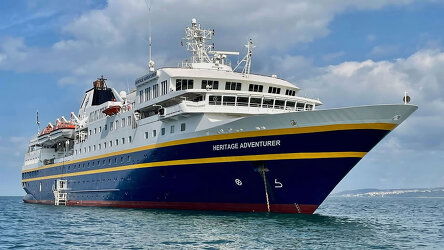
Built for polar exploration with a great track record, guests cruise in comfort onboard the Heritage Adventurer. Read more
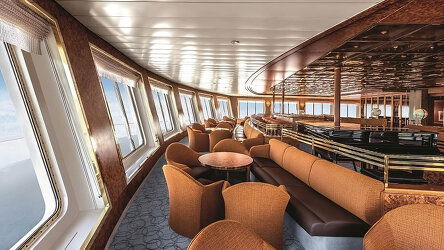
Sit back and enjoy a drink in the Observation Lounge, or experience 360-degree views from the Observation Deck. Read more
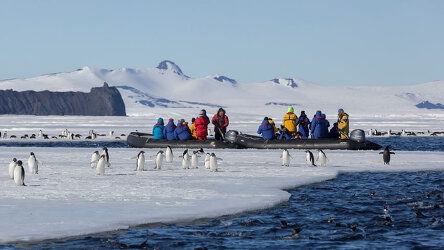
To make sure every guest has an elevated experience, Heritage Adventurer comes ready with a fleet of 14 zodiacs. Read more
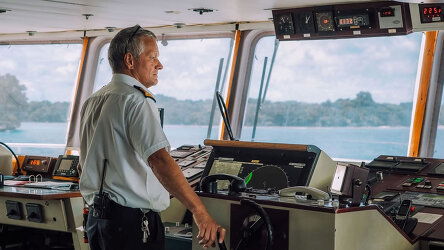
Take a look behind the scenes and see the captain at work, learn how the ship works and enjoy some of the best views onboard. Read more
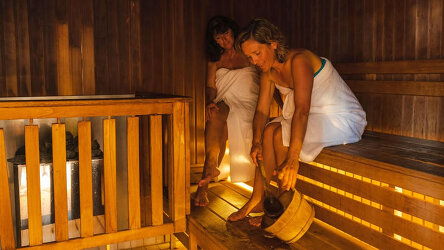
Keep your fitness up during your cruise in the onboard gym or alleviate and revitalise yourself in the spa. Read more
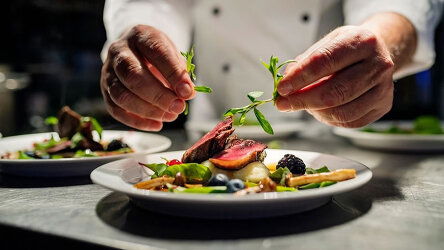
Whether it's a quick bite to eat or a multi-course evening meal, Heritage Adventurer's all-inclusive dining will satisfy your hunger. Read more
Availability Click on prices below to view cabin upgrades and details
Tour & cruises prices are per person. Prices shown have savings applied, are subject to availability and may be withdrawn at any time without notice. Pricing and trip details are correct at this point in time, however are subject to confirmation at the time of booking and are subject to change by Heritage Expeditions. For cruise itineraries, cabin images are sourced from Heritage Expeditions. These should be treated as indicative only. Cabin inclusions, upholsteries and room layout may differ to the image(s) shown depending on the ship selected and your sailing dates.
Similar Cruises
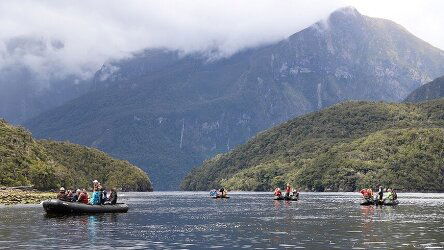
12 Days Queenstown Auckland
Operated By: Heritage Expeditions

12 Days Queenstown Queenstown
Operated By: Heritage Expeditions
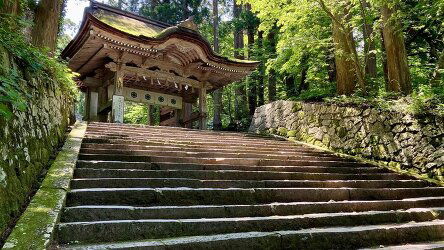
12 Days Tokyo Osaka
Operated By: Heritage Expeditions

12 Days Queenstown Queenstown
Operated By: Heritage Expeditions
